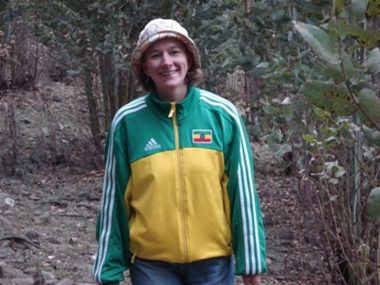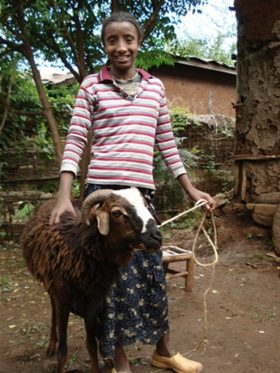
Alumna Katherine Carter taught English inEthiopia from 2004 to 2006 through the U.S. State Department’s English Language Fellow Program. Following that experience, she joined the faculty at Addis Ababa University, where she teaches in the department of sociology/social anthropology. Carter earned her master’s degree in sociology at UNC-Charlotte and her doctorate in ethnography from the University of Debrecen, Hungary, in 2007.
Reflections on Teaching in Ethiopia
By Katherine Carter ’96
Teaching in any country at any level poses rewards and satisfactions, challenges and difficulties. These rewards and challenges are magnified in Ethiopia. I have taught in Ethiopia for the past four years and know that I am making an important difference in the lives of my students, especially women. It is what keeps me going during difficult times. My students tell me, sometimes whispering, “Thank you for coming to our country,” “Thank you for being a role model for me,” “You made us think in a different way today,” “You have given me strength and encouragement, “You have made me think about my life in a different way,” and “Thank you for being open and democratic in the class.”

Students invite me for coffee at the cafeteria and ask about my life in America, my family, my health and most important, “What do you think about Ethiopia?” and “Do you like our country?” I know that Ethiopians are proud people and they love their country. They certainly want foreigners to feel the same.
I explain that I adore Ethiopia and share some examples. I tell them I am humbled by people’s strength and character in the face of much death and disease. I tell them I am impressed with their sense of togetherness and spirit. I am amazed by their great patience and persistence among extreme bureaucracy. I am in awe of my neighbors who walk out of their shack-like homes everyday with heads held high, securely wrapped in white shawls, off to work or the market or to a funeral. I tell them my friend’s child bowed when receiving bread, though he had another spell of malaria. And then the beggars blessed me when I gave them a dime, though they had no shoes. I tell them dignity and pride surround difficult living conditions. They beam with happiness. These special times with students help me through the many challenges, including large classes without resources and other bureaucratic issues.

I am told that my first class of the semester has more than 100 students. There is no computer equipment available for Power Point presentations, no LCD, no microphone. Desks are nailed down in rows. I am lucky — I have a white board, and I bring my own dry erase markers. Other classrooms have only a board and chalk. The GNP in Ethiopia is $120 per year, so students can’t afford to buy a stack of books at the bookstore each semester. In some towns throughout the country, university students can’t even afford to make photocopies. I am fortunate in the capital city. I can give students articles to make copies. That will be one burden off of my shoulders.
But one challenge is presented when I make original photocopies from textbooks in the secretary’s office. Sometimes she allows me to make copies in peace. Other times I feel her breathing down my neck as she mutters, “This is a poor country,” and glances at my stack of papers to be copied. I know it’s a poor country and I feel bad, but I need the articles. Printing also poses challenges. I go to one of my colleague’s office, who has the only printer in the department, bring my own paper and hope his patience also doesn’t run out with my excessive printing needs.
The semester begins and I meet my 100-plus students. They are respectful, quiet and shy, and generally excited to begin the semester. Though Amharic is their mother tongue, they speak excellent English. High numbers of high school students apply to Addis Ababa University, where I teach. Only the students with the highest GPAs and highest scores from the National High School Exit Exam are accepted. No other criteria are examined. They must also afford the $20 per month tuition, which many students cannot. Students’ names are difficult to pronounce and to learn. Names such as, “Esu Balew,” “Asmamaw” and “Meweded” cause me to stutter. Still, I am determined.
The second day of class, I ask them to write their names in large letters on paper with a dark pen. I then ask if I can take a picture of them holding their nametag. This causes an outburst of laughter. No teacher in his or her 12 plus years of schooling has ever done such a thing. After the commotion, I divide students into groups of 10 and guide them to the front of the room to take a quick snap with my camera. Some are too shy to do this. They politely refuse. I am still determined to learn their names throughout the semester. Some students arrive late and I ask the latecomers if they had a good breakfast of coffee and bread. This causes a good laugh by everyone because generally Ethiopians eat bread (injera) three times a day and coffee is connected to important rituals and customs.
I look around the room and see an equal representation of males and females. This pleases me, because in the rural areas, teachers usually have 80 percent male students and male colleagues, all-male administrations, and female secretaries and cleaners. The women in my class have worked hard to get here. They have shown their ability in a culture that tells them it is best if they stay at home.
Throughout the semester, I learn that students are accustomed to “chalk and talk” lectures. I’m not. I am determined for students to have some collaboration, discussion and debates. They resist, but I keep pushing. I divide them into groups of 10, and they role- play the perspective of Marx, Durkheim and Weber during the Industrial Revolution. They complain about the preparation for the role- playing, but I won’t let up. Finally, the groups make their presentations, and I am impressed. They demonstrate their knowledge of sociological theories, use old clothes as costumes, food and other props. I can see they had fun, too. In feedback papers, some students thank me and say they wish other teachers would adopt this method. Some explain they have never in their lives done such a thing. Others say it was a complete waste of time and plead that it not be repeated.
I understand their reasoning and fears. Each culture has different expectations concerning teaching and learning, and education in general. It’s not right for me to impose my philosophy of teaching on their educational system. But I also know many of them will earn their graduate degrees in the United States. I gently explain that skills such as collaboration, active learning and presentation are expected skills to have in U.S. universities.
I also incorporate my understanding of who they are and what is important to them in the illustrations I give. The Orthodox Church, for example, founded in 4th century AD, plays a significant role in the customs and daily life throughout the country. When explaining how Weber viewed rationalization of society, I give a hypothetical example of the Church abandoning custom in favor of results and efficiency. Students grasp my point because I make it as relevant to their lives, which is very different than mine, as I possibly can. They mention this on the end-of-semester class evaluations, and I am reminded why I love teaching and why I am here in Ethiopia.
All of a sudden, the challenges of making photocopies and printing don’t seem to matter anymore. I am making an important difference in their lives, especially the women. I have presented them with a new approach to learning. But more important, teaching and living in Ethiopia have presented me with valuable lessons in humility. I am humbled by people’s patience, pride, spirit and character. I am fortunate to be here to learn these lessons. I have learned much more than I have taught.


